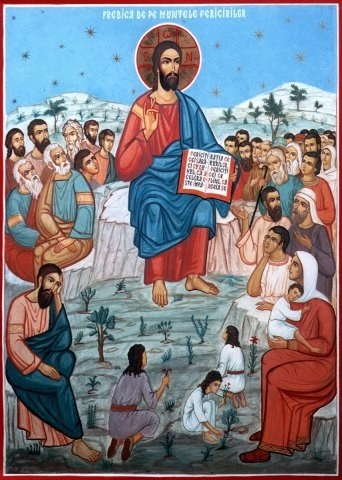Where Are Jesus’s Disciples?
Scripture Readings

Look around. Where are they? There are so many who loudly proclaim themselves to be Christian—and are so ready to point out those whom they believe don’t measure up to their standards. Yet, Jesus himself was quoted as saying [Matthew 7:21], “Not everyone who says to me, ‘Lord, Lord,’ will enter into the kingdom of heaven.” If we want to be genuine followers of Jesus, we need to pay attention to that warning. No externals can qualify us as disciples—not even baptism. Our baptism was simply a pledge of eternal life; but that pledge needs to be redeemed by our following Jesus in his suffering, death, and resurrection. Today’s passage from Saint Luke’s gospel shows us the way. It’s the Christian manifesto, and it demands that we change. That change requires much more than just a change of behavior. It demands a change of heart—a metanoia.
Remember the sixties? Remember the Age of Aquarius, when “counterculture” was the buzzword of the decade? It seems so quaint and naive today. Yet here, in words over two thousand years old, we’re presented with a genuine counterculture. There are at least two features that set today’s gospel passage apart from others: first, it requires no special translation and contains no obscure nuances. It’s plain, simple, and forthright. Second, it’s radical. It contradicts all our social, cultural, and economic assumptions. It condemns our way of life to its core.
We live in a Darwinian world, where survival of the fittest is the order of the day. We take it for granted that life is a struggle to survive. It’s the way of the world that there will be winners and losers, successes and failures. Our lives depend on which category we wind up in. We have a survival instinct. We must be strong enough to survive, to be counted among the winners, and so, we must fight.
Our survival instinct permeates every aspect of life. We need to succeed. We need to get good grades, to get awards and scholarships, to get into good schools. We need to do whatever’s necessary to advance in our careers, to hold a good job, to become financially independent, to live in the right neighborhoods, to have a comfortable retirement, to be the envy of our friends and neighbors. We need our favorite sports teams to win, and we’ll get behind them and cheer them on. We’ll make sure they have the best facilities and recruit the best players and pour our resources into them because we need them to win. And should some group challenge our values or way of life, we’ll do whatever it takes to overcome them, either by converting them to our way of thinking or by going to war and forcing them to submit.
In one sense, Karl Marx was right. Human life is motivated by this win/lose, us-against-them dialectic. It’s the way of the world, but it’s not the way of God. In the eyes of God, there are no winners or losers, no “us” versus “them.” There’s only us. “But,” you may ask, “what about the scribes and Pharisees of Jesus’s time? And what about the Church? Aren’t there saints and sinners? Didn’t we burn heretics at the stake?” Our instincts want to interpret everything from their win/lose perspective. But the teachings of Jesus are hard. They fly in the face of our natural instincts. He refused to endorse winners and losers. Even when he said, “Woe!” to the scribes and Pharisees, it wasn’t a condemnation, but rather a recognition that, despite their position as teachers in Israel, they had not yet risen above their baser instincts. Jesus saw all human failings as a source of sorrow, not of condemnation and punishment.
What lies at the root of our natural instincts is what we call the ego. The ego is nothing more than a fearful thought. The ego is afraid. It’s afraid that it’s not going to have what it needs to survive and so it will die. The ego believes that it alone is responsible for its survival, and so it embraces self-reliance as a way of life. For the ego, acceptance and surrender are unimaginable thoughts. And yet, without acceptance and surrender, there’s no room for God and faith is meaningless. For those whose life focus is survival, wining is their only value, and Ego is the name of their God.
How is Jesus’s message any different? What did he preach, teach, and demonstrate in his life, death, and resurrection? What does it take to become a genuine Christian—an authentic follower of Christ? What, after all, is the message of today’s gospel? I can summarize it in just two words: stop fighting. Stop fighting anybody or anything. Stop trying to win. Stop trying to be right. Give up the idea that your success or failure in life depends on you. How many times do we have to learn the lesson that our lives hang by a thread, and we’re incapable of adding an hour to our allotted time by our own efforts. Our struggles and our fighting avail us nothing.
What matters is our utter and complete reliance on the God who called us into being, who sustains us, and who loves us into eternity. Christ, as the Letter to the Hebrews [12:2] reminds us, is our pioneer. His death and resurrection are not for himself alone. He’s our trailblazer so that we might follow him and go where he has gone before us. How do we do that? How do we make his death and resurrection our own? It’s by making his mindset our own. It’s by laying down the weapons of our egos and embracing acceptance and surrender with faith in God our Father just as Jesus did. When we do this—as it’s described in today’s gospel—we will be rewarded…not with “pie in the sky by and by,” but with the experience here and now of a life of fullness and serenity, a life of joy and gratitude. For those brave enough to crucify the ego, the resurrection starts now.
Get articles from H. Les Brown delivered to your email inbox.
